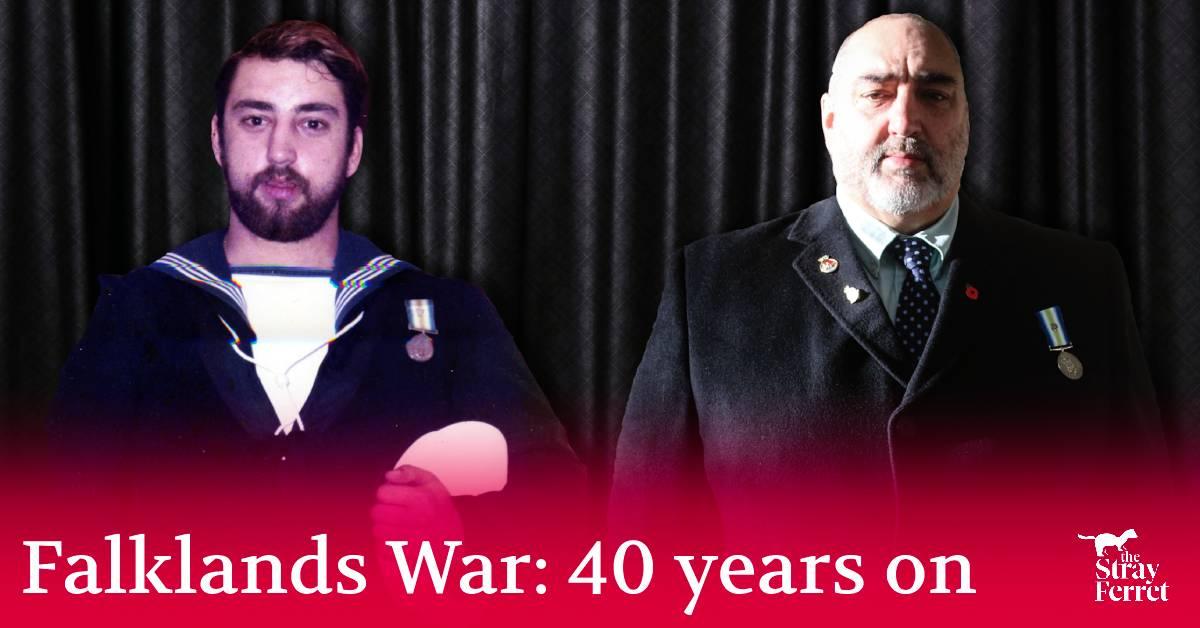Subscribe to trusted local news
In a time of both misinformation and too much information, quality journalism is more crucial than ever. By subscribing, you can help us get the story right.
- Subscription costs less than £1 a week with an annual plan.
Already a subscriber? Log in here.
29
May 2022
'We felt apprehension, but not fear': Harrogate seaman remembers the Falklands War

The Stray Ferret is publishing two articles this weekend looking back at Harrogate's links with the Falklands War.
Yesterday, we spoke to Harrogate woman Christina Nelson who was only 22 when her husband Stephen Heyes was killed aboard HMS Ardent aged 21. Read the article here.
"Where's the bloody Falklands?" was Harrogate sailor Neil Harper's first thought following the Argentine invasion on April 2, 1982.
The former Harrogate High School pupil was always destined for a career at sea. He spent his formative years as a sea cadet in Harrogate and his dad was in the Royal Marines.
He was 19 when the British government dispatched a naval task force to the islands in response to the invasion.
Mr Harper joined the Navy aged 16 and was an able seaman gunner so knew that his services would be required.
After returning to Portland in Dorset, the captain of HMS Argonaut told the crew:
'Attack after attack'
Mr Harper said the feeling onboard the ship on the 6,000-mile journey "was of apprehension, but not fear".
He said:
The sailors encountered the Falklands' unusual landscape, which Mr Harper described as being like "The Yorkshire Moors without the trees".
Many hoped the crisis would be solved through diplomacy, but the fighting was fierce.
On May 21, HMS Argonaut faced assault from the sky. Mr Harper remembers "attack after attack" and frantic efforts to save the ship.
He said:
Two of Mr Harper's friends, able seaman Iain Boldy and able seaman Matthew Stuart, were killed.
'Are we gonna win?'
Lieutenant Peter Morgan is credited with saving HMS Argonaut after he dropped one of the ship's anchors to use as an emergency brake.
The crew worked around the clock to restore power and radars. The captain sent out a signal to the crew to say they couldn't move the ship, but could still fight.
Over the space of a couple of days, HMS Ardent, HMS Antelope and HMS Plymouth were also bombed.
Mr Harper said:
Once-in-a-lifetime assignment
Stray Ferret journalist Tim Flanagan was chief reporter for the Harrogate Advertiser in 1982.
He said the war was the talk of every pub, shop and workplace in the town.
Journalists at the paper kept a close eye on events due to the military connections in Ripon and at Pennypot in Harrogate.
Mr Flanagan remembers interviewing Harrogate woman Christina Nelson, Stephen Heyes' widow, not long after he died. She told him how Stephen's pet cat Charlie still missed him, which has stuck with the journalist 40 years on.
Harrogate soldier Gavin Hamilton was also killed during the war and posthumously awarded the Military Cross for bravery.
Valentines messages
A year after the war was over, the newspaper sent Mr Flanagan to the Falklands. It was a once-in-a-lifetime assignment for a local news journalist who normally didn't get further than Northallerton.
He stayed aboard HMS Sir Tristram to visit Royal Engineers from Ripon who were helping to rebuild runways and clear mines.
Mr Flanagan took with him some special messages from the wives of Harrogate district servicemen who were stationed there.
Legacy of war
The war lasted just 74 days but 40 years on, time has not healed all the mental wounds brought on by the conflict.
The UK government's treatment of its veterans, and their widows, have made it more difficult for them to receive closure.
Christina Nelson has campaigned for the government to subsidise expensive air travel to the islands so widows can visit their partners' graves.
She said:
Like many veterans, Neil Harper has suffered from PTSD. He left the Navy in 1989.
He returned to the Falklands in 2019 with some fellow seamen who he served with.
He added:
255 British military personnel died in the war. Three islanders and 649 Argentine soldiers also died.
0